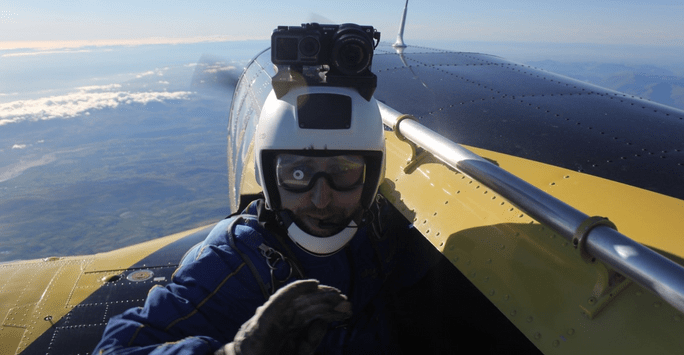
Student Spotlights pass the mic to our student doctors, to hear their take on their School experience and shine the light on a particular role, team or pathway through the School of Medicine.
Alongside his studies, Student Doctor Eoin Black is also a skydiving photographer and over the past eighteen months has spent his weekends documenting this once-in-a-lifetime experience for over 200 people. He recently worked with charitable organisation Oddballs to help raise awareness about testicular cancer.
What inspired you to pursue a career in Medicine?
Having no ties to medicine in my family, the origin of my interest in medicine as a career is rather unique. I’m from a small town just to the south of Belfast in the north of Ireland. My father taught me how to play traditional Irish music when I was very young and throughout my teenage years I played in various groups and bands throughout the country.
Surprisingly, two members of the band I played in were GPs and that got me started down the road of thinking of medicine as a career.
I organised some work experience with a family friend at a local hospital and from then on there was no turning back. I was hooked!!
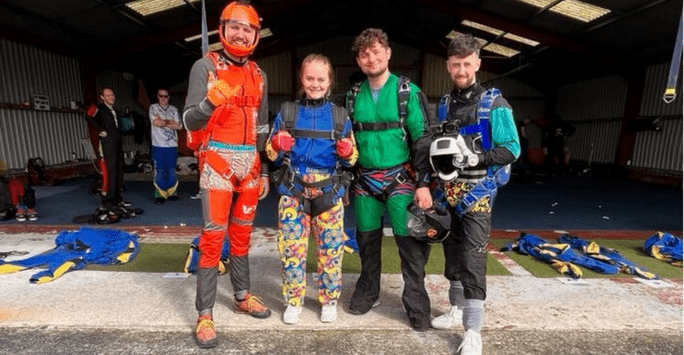 Eoin (far right) ready for a skydive for Oddballs charity
Eoin (far right) ready for a skydive for Oddballs charity
What was it that brought you to Liverpool?
Liverpool shares a rich history with the Irish and my family has had its fair share of this. My father worked as an electrical engineer in the city for six years during the 90s at a time when some of the first fibre optic cables were being manufactured in the UK.
When I was deciding on Liverpool as my first choice university, my Auntie was a mature student here training to be a radiotherapist. She was able to show me around when I visited for my interview and had nothing but praise for the place, so I think my fate to follow suit and study in the city was in the genes. She currently works in the Clatterbridge Cancer Centre which came in handy during my Med D oncology rotation.
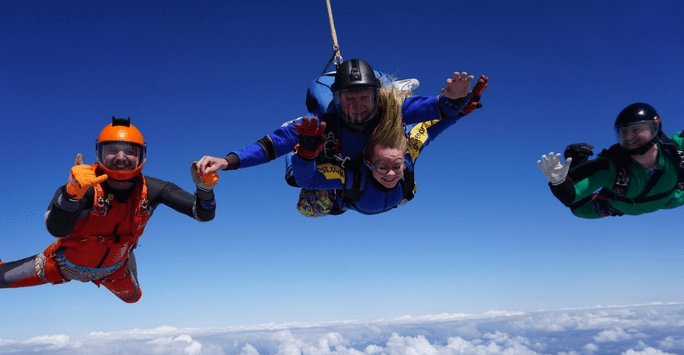 Oddballs representative Zoe with members of the University skydiving team
Oddballs representative Zoe with members of the University skydiving team
How did you first get into skydiving and skydiving photography?
I first took an interest in skydiving when I was 14 after watching a documentary about the Red Bull skydiving team called “Miles Above”. I knew from then on that I wanted to not only skydive but learn to skydive by myself. The minimum age to be able to skydive in the UK is 16 but unfortunately for me it also requires parental consent while under the age of 18.
It took a year to convince my parents to sign the waiver but my persistence eventually paid off and I completed my first solo skydive aged 17.
I have since gone on to achieve three different types of skydiving licence and hold eight different internationally recognised qualifications in the sport, as well as completing over 500 skydives at nine different sites across five different countries.
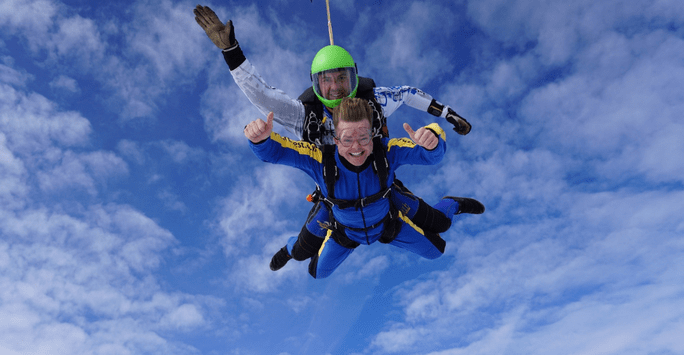 Photographing a skydiving instructor and student
Photographing a skydiving instructor and student
The photography side of skydiving came much later and I fell into it (pardon the pun) rather by accident. I bought a cheap action camera to wear in freefall so me and my friends could have some memories of the jumps we did together.
What surprised me most was the way they would react when they watched themselves on screen and how thankful they were afterwards.
Skydiving is great fun but much more meaningful when you have some videos or photos to look back on. I decided to dedicate my time to learning the art of freefall photography and what started out as a passion project eventually led to me getting hired as freefall photographer at Skydive Northwest in the Lake District.
What do you enjoy most about skydiving?
There are many great aspects to be enjoyed about skydiving! The obvious one would be the adrenaline rush from the fall out of an aircraft but the longer you stay in it the more reason you have to continue pursuing it.
It can be a once in a life time moment for some, a hobby or sport for others, even a form of art or a profession. Just when you think you’ve reached a limit with it another opportunity presents itself.
I enjoy the charity work that skydiving helps me get involved with. Recently I was approached by the testicular cancer charity Oddballs about documenting a skydive by one of their university representatives. It was an amazing experience as well as a privilege to take part in this project with them. This altruistic side of skydiving is something I am keeping up this year by becoming the university rep for a charity called Uplift. More on that in the future hopefully!
What have been the biggest highlights on the MBChB programme so far?
The programme has offered a lot of opportunities to me and there are many moments which I am proud of. Most recently, I was very pleased to have passed the summer written and clinical exams first time round as it demonstrated to me that all those late night library sessions are worth it in the long run!
I undertook an additional placement in general surgery this summer at Southport Hospital where I gained a lot of hands-on experience in theatres and carried out a clinical audit project with my supervisor.
I was the only student at Southport for general surgery which meant most days I could take full advantage of scrubbing in and assisting with procedures.
I was able to build a small logbook of my experiences during that time which I hope to continue to add to throughout a surgical career.
My extracurricular life at the University has equally been filled with many amazing moments. At one time, I held committee positions as the social and welfare secretary and president of the University skydiving team and have competed in the UK Skydiving league winning silver back in 2019. My achievements in the sport were also recognised by the Royal Aeroclub Trust when they awarded me a flying bursary granted to individuals who achieve a higher level of qualification in an air sport.
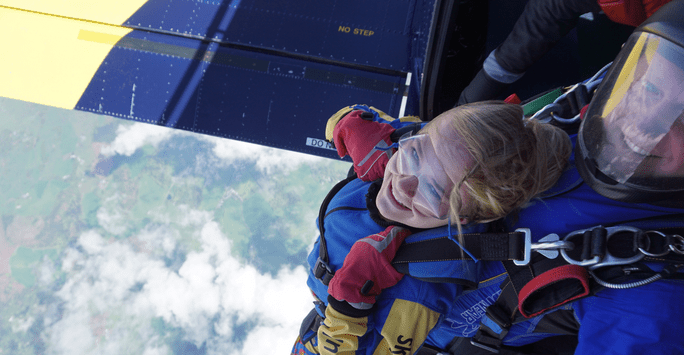 Odballs representative Zoe Whitehead ready to go
Odballs representative Zoe Whitehead ready to go
What is your approach to work/life balance?
Since first year I have near enough adopted the same approach to my work/life balance and it has worked for me so far. Because skydiving is an activity I can only participate in on the weekends, I dedicate Monday to Friday to getting all my work and revision finished.
That way I have the entire weekend to myself to enjoy pursuing my passion and hobby in the sky.
Don’t get me wrong, that doesn’t mean I don’t meet up with friends and do fun activities during the week like playing music and occasionally scuba dive on a Wednesday afternoon. But if I’m over indulgent and don’t have my work finished by Friday then that means my boots are on the ground until I do.
Skydiving has proven to be a powerful motivator for me in medicine as I usually can’t go longer than two weeks on the ground before I’m having adrenaline withdrawal (maybe not withdrawal in the traditional medicine sense).
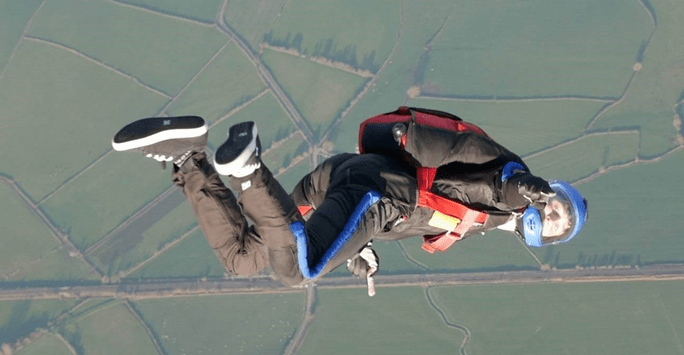 Non-verbal communication is an important skill to master
Non-verbal communication is an important skill to master
And perhaps the opposite is true; medicine has become an incredibly useful tool to have in skydiving because of its transferable soft skills.
Team work, planning, organisation, time management, communication (especially non-verbal), simulation and even response to emergency scenarios are all vital skills to being a good skydiver and all of them have been enhanced through studying medicine.
Has Eoin inspired you to take the leap yourself? Check out the University of Liverpool Skydiving Club at Sport Liverpool (link). Learn more about the Oddballs Foundation and they work they do around testicular cancer on the Oddballs website (link).
Get in touch with mednews@liverpool.ac.uk if you are interested in stepping into the Student Spotlight or would like to nominate a student or group to do so.